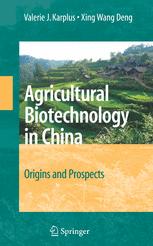

Most ebook files are in PDF format, so you can easily read them using various software such as Foxit Reader or directly on the Google Chrome browser.
Some ebook files are released by publishers in other formats such as .awz, .mobi, .epub, .fb2, etc. You may need to install specific software to read these formats on mobile/PC, such as Calibre.
Please read the tutorial at this link: https://ebookbell.com/faq
We offer FREE conversion to the popular formats you request; however, this may take some time. Therefore, right after payment, please email us, and we will try to provide the service as quickly as possible.
For some exceptional file formats or broken links (if any), please refrain from opening any disputes. Instead, email us first, and we will try to assist within a maximum of 6 hours.
EbookBell Team

5.0
78 reviewsOver the last thirty years, China has developed one of the world’s largest public research programs in agricultural biotechnology. Building on a long tradition of agricultural advances, Chinese scientists have applied biotechnology techniques to develop hundreds of novel crop varieties suited to local farming conditions and challenges.
Agricultural Biotechnology in China: Origins and Prospects is a comprehensive examination of how the origins of biotechnology research agendas, along with the effectiveness of the seed delivery system and biosafety oversight, help to explain current patterns of crop development and adoption in China. Based on firsthand insights from China’s laboratories and farms, Valerie Karplus and Dr. Xing Wang Deng explore the implications of China’s investment for the nation’s rural development, environmental footprint, as well as its global scientific and economic competitiveness.
About the Authors
Valerie J. Karplus graduated from Yale University in 2002 with a Bachelor of Science degree in Molecular Biophysics and Biochemistry and Political Science. She lived in China for two years, where she researched the development and impact of agricultural biotechnology in China while based at the China Agricultural University (2002-2003) and National Institute of Biological Sciences, Beijing (2005-2006). Currently she is pursuing graduate study at the Massachusetts Institute of Technology.
Dr. Xing Wang Deng is the Daniel C. Eaton Professor of Plant Biology at Yale University. His scientific work focuses on the molecular and genomic basis for plant development and agricultural biotechnology. He also serves as the co-director of the National Institute of Biological Sciences, Beijing and the founding director of the Peking-Yale Joint Research Center of Plant Molecular Genetics and Agro-biotechnology. He leads a research team that has published well over a hundred peer-reviewed articles in his area of research.